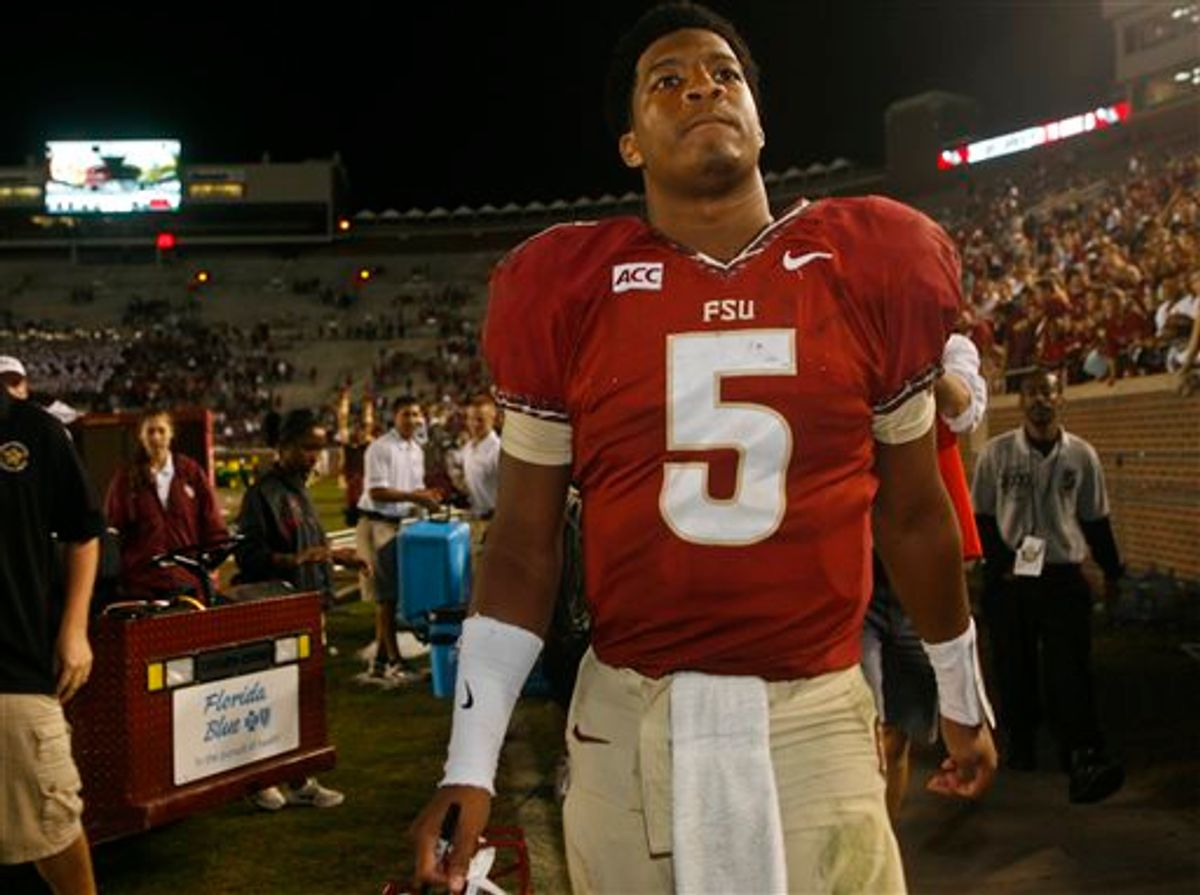This weekend, the New York Times published a lengthy and damning report on the Tallahassee Police Department's history of obstructing investigations or outright ignoring alleged crimes committed by Florida State University football players. According to the Times, "law enforcement officers are finely attuned to a suspect’s football connections," and those connections are "cited repeatedly" in police reports. After all, Seminoles football means big money for Tallahassee. Each home game brings a reported $10 million to the local economy, and some of that money directly lines cops' pockets, as many on the force collect extra pay guiding traffic on game nights. And plenty of these cops are Seminoles fans, plain and simple. But beyond the fandom and the economic incentives to look the other way when it comes to players, it's not hard to imagine how a police force -- which, like all police forces, is already empowered to act with impunity -- would view a similarly powerful community presence like the FSU athletic department and its student athletes as equally above the law.
The reporting from the Times' Mike McIntire and Walt Bogdanich paints a frightening portrait of how the "towering presence of Florida State football" repeatedly, systematically "cast a shadow over justice in Tallahassee." Frightening, but not entirely new. Earlier this year, the Times also published a piece on how the Tallahassee police department, officials within the athletic department and administrators at FSU obstructed or otherwise delayed the sexual assault investigation into one of its star players, Seminoles quarterback Jameis Winston. An investigative report from Fox Sports, also released this weekend, exposed more about the extent of the alleged misconduct.
Both reports reveal a string of events in which the police and the university knowingly obstructed and manipulated the progress of the case. After the assault was reported, police did not contact witnesses (one who happened to have video of the alleged assault), did not obtain a DNA sample from Winston because doing so would "create publicity," and, according to the woman's attorney, warned that "Tallahassee was a big football town" and tried to pressure her into dropping the case. (This is a woefully incomplete list of everything wrong with the investigation.)
The timeline at which these events unfolded is just as galling. After allowing the case to go dormant for months, the police waited nearly an entire year after the initial report before sending it to the prosecutor's office, at which point prosecutor Willie Meggs declined to charge Winston, citing a lack of evidence. (Meggs has said the police department's handling of the case actively hindered his ability to do his job.) And according to multiple reports, school officials waited to meet with Winston until late January 2014 — a full 12 months after they knew Winston was the suspect in the case, and a month after the 2013 football season ended — to discuss the alleged crime, a blatant violation of its obligations under Title IX.
This indifference and outright animosity toward victims is a national problem. We were reminded of this, once again, as a culture of sexual and other violence is alleged to have flourished under the noses of football coaches in Sayreville, New Jersey.
And the larger problems of policing are hardly problems isolated to Tallahassee. Last year, an extensive national survey on sexual assault confirmed once again that law enforcement agencies are often poorly equipped and inadequately trained to properly document sexual assault and intimate partner violence cases.
According to that survey, one of the problems behind the mishandling of these cases is a fundamental misunderstanding of sexual assault -- shared by many in this country. Police protocol is often designed around so-called stranger rape, when in fact a majority of victims know their perpetrator. Often, that perpetrator is a known member of the community rather than some monstrous outlier.
But both the Times and Fox Sports reports reveal something about police failures that is, to my mind, far more dangerous: the willfulness with which some in law enforcement obstruct the proceedings of these cases. How many of these men share the same mentalities -- and the same capacity for violence -- as the rapists and abusers they are meant to police. This reality should give pause to anyone who blithely asks why victims of sexual assault or intimate partner violence sometimes choose not to report. Why would a woman report an assault when she has no reasonable expectation of justice -- in fact, when there is good reason to believe that there will be additional abuse and victimization at the hands of the cops?
Which is, perhaps, the larger question. The same question that has been echoing throughout the country in the wake of the killing of Mike Brown in Ferguson, the sexual assault of multiple black women by Oklahoma City Police officer Daniel Holtzclaw and the staggering violence routinely committed by white police officers against unarmed black people: Can we reasonably expect the police to bring justice? And what does justice mean, what does accountability mean, for victims of all manner of violence in the face of such a deeply racist, deeply misogynistic institution?
This is a conversation that has long driven the organizing and activism in black communities and other communities of color disproportionately impacted by police injustice. But it's a reckoning that, because of that activism, has taken hold in the mainstream. Now is a moment in which, perhaps more than ever, people are asking: The police are policing us, but who's policing the police?

Shares